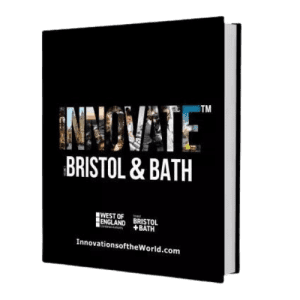Innovation is the application of creative solutions to real-world problems – a basic maxim, and one that perhaps obscures the more complex processes that underpin its subject. In reality, innovation can require patient investment in both fundamental and applied research, cross-discipline and cross-sector collaboration, risk-taking, iteration, trust, vision and civic engagement. These attributes and capabilities are at the heart of research-intensive universities and, while innovation ecosystems across the globe differ with regard to many of their attributes, the presence of world-class research-intensive universities is a constant.
The University of Bristol is one such university – ranked amongst the very best in the world for the quality of its research and innovation, and deeply committed to its civic ethos of community, co-production, and social responsibility. We strive for research excellence and pursue knowledge for its own sake. But we are also committed to realising the beneficial impacts of our research on society. This is reflected in the balance of our research between blue skies discovery-led research which explores the very essence of humanity and our planet, and challenge-led research focused on solving practical problems.
This latter commitment is exemplified by the fantastic work of our university research institutes. These focus on solving many of today’s biggest challenges such as health (Elizabeth Blackwell Institute), the challenges of living with environmental change (Bristol Cabot Institute), data science research and society (Bristol Jean Golding Institute) and exploration of the human condition (Bristol Brigstow Institute).
Through these and other initiatives, our researchers seek to understand our world today and develop ideas for its future. But innovation isn’t just about ideas. It’s about making ideas happen. That’s why we work in partnership and support industry, small businesses, the public sector and society to better understand challenges and help translate innovative ideas into creative solutions.
There is no short-cut to achieving successful innovation. It requires patience and a supportive ecosystem. One that, for example, brings scientists, engineers, entrepreneurs and investors together; harnesses local diversity; provides access to finance and global networks; stimulates enterprise activity and supports new business creation. Collaboration is often key. But effective collaborations need time and resources to share knowledge, develop understanding, and build trusting relationships.
Helping to provide a supportive environment for innovation in our region is just one of the ways the University of Bristol can contribute towards its success. Throughout the last decade, we have been extensively engaged with public and private sector partners to develop research and innovation themes, provide high-quality infrastructure, skills, and finance, and identify local growth and regeneration opportunities. We also strive to embed and foster entrepreneurial thinking in our staff and students.
Fortunately, and not accidentally, Bristol and the West of England is already home to one of the UK’s fastest-growing and most globally significant tech clusters. It boasts one of the highest business start-up and survival rates; enjoys globally recognised strengths in sectors such as aerospace, zero carbon and the creative industries; and is renowned for innovation in AI, 5G, semiconductors, quantum technology, cybersecurity, robotics, haptics, and data science. Opportunities to network, to collaborate and to share knowledge across and between these key sectors of the future economy are plentiful.
Looking ahead, the University relishes the expectation and imperative that it will serve as a key innovation engine within this buzzing and ambitious ecosystem – a vital source of talent, skills, ideas, technologies, expertise and partnerships. Our plans for the new Temple Quarter Enterprise Campus, central to the emerging Temple Quarter regeneration programme, provides just one example of this defining commitment.
Designed with co-creation and multidisciplinary working at its core, the Enterprise Campus’ three primary entities – the Bristol Digital Futures Institute, the Quantum Technologies Innovation Centre, and the Bristol Inclusive Economy Initiative, draw on existing research strengths and will see us partner with hundreds of SMEs, large corporates, third sector and community organisations, and local and regional government. It will also host landmark new initiatives such as MyWorld, a £46 million Bristol-led programme which will position the South West as an international trailblazer in screen-based media; creating new R&D facilities and partnerships, and connecting regional SMEs and large companies with global tech titans including Netflix, Google, and Microsoft.
COVID-19 has caused untold disruption and misery over recent months. But when I look at the emerging post-pandemic world, I believe there is cause for considerable optimism for our city-region. Major new developments, partnerships and strategic initiatives like the Enterprise Campus provides an opportunity for the West of England to build on its unique ecosystem and cement its global reputation as a place to collaborate and innovate.
For this to happen, it’s not just about ideas. It’s about making ideas happen. I believe the skills, networks, infrastructure and ambitions are in place across our region to ensure that they do.












